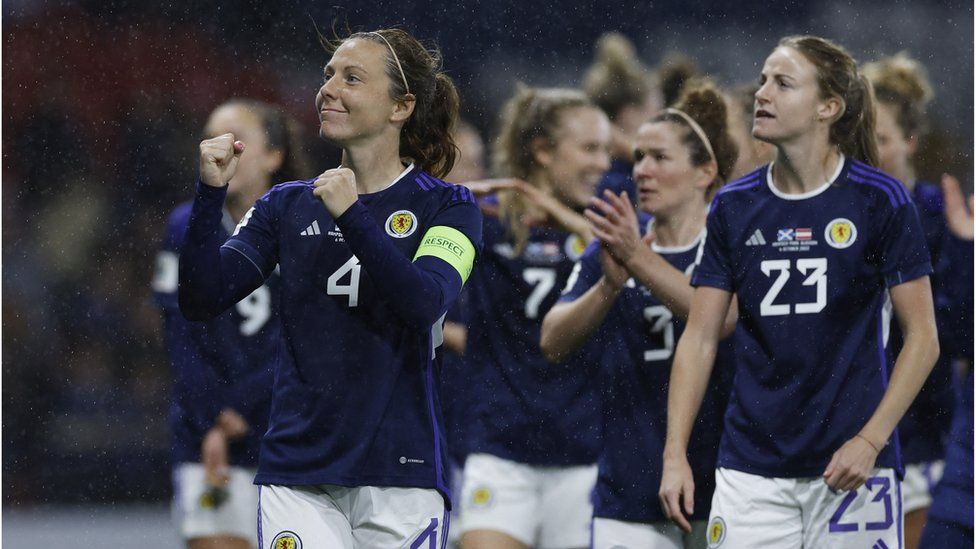
The case had been launched by Scotland captain Rachel Corsie (left)
The captain of the Scottish women’s football team has withdrawn an inequality case against the SFA on the day the hearing was due to start.
Rachel Corsie was due to represent her national team mates after accusing the governing body of not treating the women fairly on pay and conditions.
But a statement from the SFA said the matter had now been resolved without the need for tribunal proceedings.
The case had centred on claims of inequality compared to the men’s team.
This included in areas such as facilities, travel and pay.
A statement from the SFA said both they and the players were pleased that the matter had been resolved, but no further details of the deal have been made public because of a non-disclosure agreement.
BBC Scotland’s sports news correspondent Chris McLaughlin said he understood the women’s team had now signed an agreement that was on the table last year.
He added: “The big question is have they changed the terms of that agreement, has the SFA given any ground and has their been any investigation into claims of disrespect and abuse?”
The legal action was announced last December, with the tribunal due to have been held this week.
Aston Villa defender Corsie said: “As captain, I believe we have a responsibility to push for the highest standards on and off the field.
“The Scottish FA has made significant inroads in this regard and together we are on an evolutionary journey. We are proud to have parity, not just for the current generation but more significantly for future generations of players.”
Corsie said last year that the resources provided to the women’s were “not to the best level”, adding: “In comparison to what either club environments are, what other national teams are given, other teams in the association are given, aren’t equal to what we get.
“When you become aware of that it makes you feel like you’re less important than others.”
Last December, two of Corsie’s Scotland team-mates also spoke out about why they were supporting the legal action against the SFA.
Real Madrid midfielder Caroline Weir, who has won 100 international caps, said they had for many years felt like an after-thought, with sponsorship deals going overwhelmingly to the men’s game.
“If shared out equally, there would be a dramatic increase in funding for women’s and girls’ football at all levels that would be transformative,” she said.
Scotland and Chelsea star Erin Cuthbert said: “This campaign must be the start of an irreversible turning point to forever change our national game, and the way women players are treated.”
The US women’s national team won a landmark equality case last year where they secured a pay-out of more than £17m.
The SFA’s chief executive Ian Maxwell said the growth of the women’s game was one of its “highest strategic priorities”.
He added: “We have reiterated our commitment to equality – specifically with regard to commercial appearances, prize money distribution and resources.
“We must now look forward with a shared goal: to return to major tournaments; working together to bring success on the field that will in turn encourage broadcasters and rights holders to do more to bridge the value gap that remains the biggest obstacle on the journey to equality within the women’s game globally.”
The head coach of the Scotland women’s team, Pedro Martinez Losa, said he was pleased that the dispute had been resolved and it had never affected the professionalism of the players.
The SFA, the players union and the players themselves will hope this joint statement will bring an end to a period of toxicity that has lead to major questions being asked about the treatment of Scotland’s women footballers. In reality, it leaves more questions than answers.
The specifics of what the players were asking for were never released due, they said, to legal sensitivities.
It seems that cloak of legality will remain in place, now a resolution has been found just hours before the two sides were due to sit across from each other at an employment tribunal.
Did the SFA give ground on some of the points raised? Did the players back down and accept the deal that had been on the table for over a year?
If the SFA didn’t give ground, then what significant inroads were made in the hours it took to reach a resolution?
Nobody from either side seems keen to elaborate, despite being asked to clarify.
When the dispute was made public, Rachel Corsie talked about taking the fight to tribunal due to “years of inequity, disrespect and in some cases, abuse.”
What deal has been struck and why has it been struck at the expense of not being able to discuss it?
There is of course a bigger picture here – Scotland’s women now have complete parity with their male counterparts. How they achieved it will remain a secret, for now.








